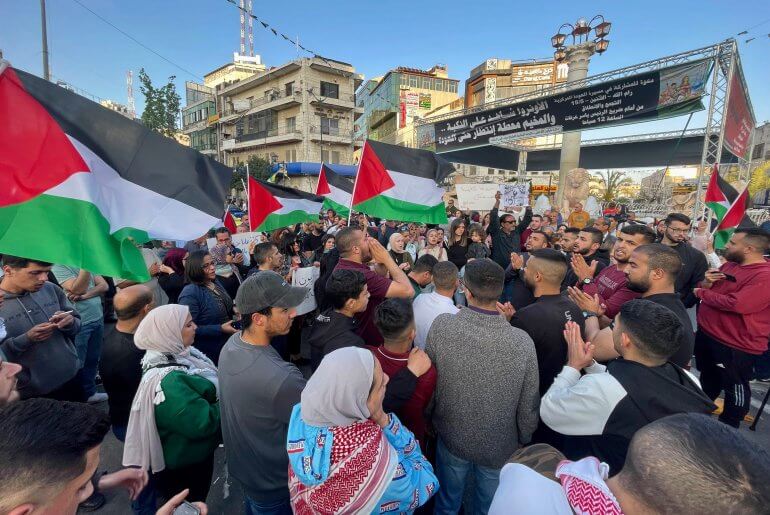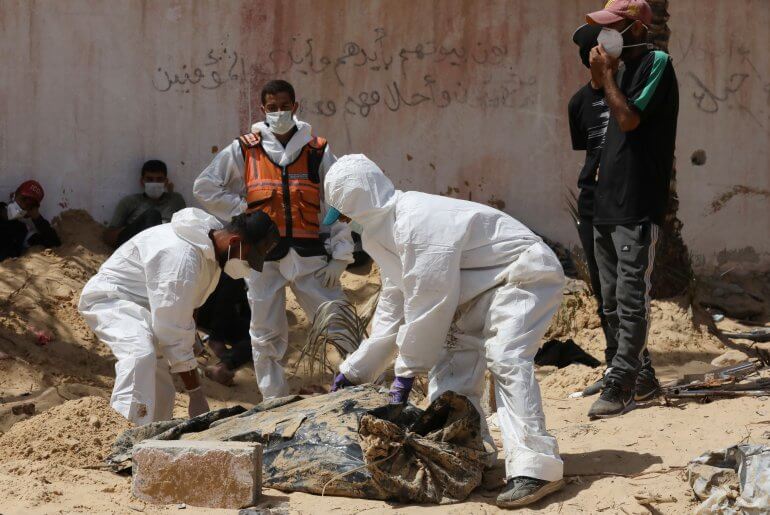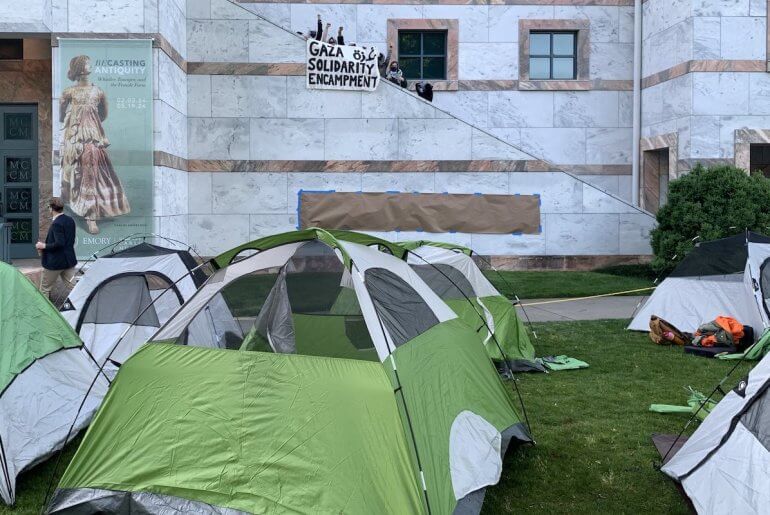THREE GENERATIONS
by Rafeef Ziadah and Phil Mansour
13 Tracks. Rafeef Ziadah. £12
Is there a place where the headlines don’t hate us/ or assume that we mysteriously die, just fall and are never killed intentionally? /Is there a place where the breaking news like the breaking waves doesn’t bring more bodies from the Mediterranean? / Is there a place where we are more than horror stories/ and numbers etched on helmets/Is there a place where we can be/…just a place where we can be, where we can be, home? asks Rafeef Ziadah, the renowned Palestinian spoken-word poet, on her and musician Phil Mansours latest album Three Generations.
Three Generations is that place, a musical palimpsest of Palestine. A place that charts and memorializes home, land, ethnic cleansing, forced dispossession, exile, sieges, resistance and sumud (steadfastness) against a century of colonial and imperialist violence and land theft. It is a quintessential, powerful record that “infects with memory and hope” specifically Palestinian memory and hope. Lyrically brilliant with powerful metaphors, imagery and a superb play on words. Soulfully moving with a fusion of contemporary and eastern soundscapes incorporating acoustic guitar, nai, oud and percussion in a different way, unique in the spoken word genre.
The album is poetically incident heavy, narrating stories of personal and collective Palestinian life and history. During an interview I conducted with Ziadah and Mansour at the virtual launch of their album at the Toronto Palestine Film Festival in September 2020, Ziadah explained that “Three Generations is both a very personal story about my own family and three generations of women in my family but also all Palestinian women.” The album beautifully patches together three generations of stories against the erasure of Palestinian life and land. The album defies the Zionist project and the Israeli settler colonial state’s cultural war upon Palestinians which consistently attempts to erase Palestinian culture and repress their narratives in cultural production, media, politics, history, education, academia and on the land itself. Defying Israeli cultural hegemony throughout the album Ziadah memorializes the on-going Nakba on tracks such as Al-Sindiyana – a Palestinian village that was destroyed in 1948. Her poetry reclaims Palestinian geographies though naming that which was destroyed, yet still remains, affirming Palestinian existence. She inserts herself into the landscape embodying and narrating the perspectives of Palestinian trees -oak trees (sindiyana) and olive trees – that have been watching over the Mediterranean for all the generations that Palestinians have endured dispossession, loss and exile. Musically, Mansour in our interview explained that for him, his role as a musician is to, “support the story or hold it up or create a mood around it, but central is the poetry and what’s being said and heard on the record.”
The album is politically astute attending to the conditions of settler colonialism and imperialism that functions through race, class and gender differences, oppression and exploitation. The ongoing land defense by Palestinians is captured on the track Jerusalem which reflects the ‘unholy alliance’ between Israel and U.S. imperialism, as the U.S. brokers colonial takings of Indigenous Palestinian lands, supposedly promised by ‘god’ to white folks, while trading Palestinian history on the open market under the guise of peace plans (such as the Trump Plan). Over the decades Zionist settlers have reconfigured Palestinian land through renaming practices and by annexing more and more territory, which are opposed via the use of Palestinian memory captured on the tracks His Story and Duma. The latter asks Israeli settlers whether the elimination of Palestinian life and land will be embraced by the messiah when he resurrects.
Throughout the album Ziadah knits together story maps that connects Palestinian knowledges of place and space, usually passed orally across generations, and uses poetry as a terrain of struggle, as Palestinian geographies and life are entangled with processes of settler colonialism, occupation, war, apartheid and European modernity. Forced dispossession, exile and the search for home are central themes in Ziadah’s poetry. The track His Story pieces the memory of Palestinians that have ‘carried home from a tent to a boat, to a new life’, as landless people and stateless refugees that have been scattered and fragmented across the Mediterranean. The poems tell stories of the wars that have followed Palestinians to their places and spaces of refuge in Lebanon, Jordan, Iraq, Syria, and elsewhere, which has produced their multiple exiles across the Mediterranean. The Mediterranean features on several tracks on the album, such as Don’t Share that memorializes the death of a three-year old Syrian boy of Kurdish background, Aylan Shenu who drowned in the sea along with his mother and brother, as they were trying to reach Europe. Ziadah explains that “although his image was shared internationally, the hostile situation for refugees remains the same. The poem is dedicated to all those crossing the Mediterranean (past and present) searching for home”. Also, Mediterranean Blues is one of the most poetically and musically moving tracks on the album that archives the condition of refugees fleeing conflict in the Middle East. The soundscapes of the Near East and orient produced by Mansour are accompanied by Zaidah’s formidable metaphors and stories of women surviving war. She powerfully rhymes:
I saw her counting bullet marks in the waves/listen to them crash sideways, like buildings collapse, sideways/….she didn’t know she would find Aleppo in the sea following her, following her and still crashing sideways/…so she learned what all refugees learn/she learned to make games of the rubble/to shake the dust/to hide shrapnel in laughter/to scream, dream, and dance/to scream, dream and dance to a war they made far away/…we are infected with memory and hope.
Artistically defiant with radical refusals, revolutionary strength, love and imaginaries of freedom, the entire album is infected with the spirit of sumud (steadfastness) and hope, necessary amid the pessimism of the loss of a revolutionary Palestinian leadership, a national liberation project, and the on-going colonial capitalist violence that Palestinians experience.
Israeli state discourses represent Palestinians as ‘demographic threats’ that is accompanied by racial, gendered and sexual violence particularly against Palestinian women, that symbolize the nation as they carry future generations in their wombs. Three Generations is also the title of a track on the album which dynamically captures the survivance of Palestinian women and girls. Despite the decades of violence Palestinian women and girls have endured against a settler project of native elimination, the poems across the album patches an active sense of presence and resistance. It narrates the (her)stories of Palestinian women that have played an invaluable role in their struggle, be it in their participation in the revolution, or in surviving though mundane activities such as taking care of children, cooking, and instilling Palestinian history and culture in their children’s consciousness. Her Story reflects the oral history of a woman, like most Palestinian women that keep the chaos of war and state violence away from their loved ones, through forms of defiance, radical care, hospitality, laughter, cooking, prayers, dabke lessons, stories and love. Her Story is most meaningful to Ziadah, she says “it’s the closest, the most personal to me, [because its] the story of my grandmother”. Like her grandmother, the album also embodies a feminist praxis, which can be beautifully seen in the music video of Three Generations that shows photographs of Palestinian women’s survivance across fragmented geographies – from inside 48’, the occupied territories, and across the diaspora.
The album also expresses stories and messages of anti-colonial refusals that reject the colonial present, as each track on the album ends with a powerful message of resistance. Grenfell with Love speaks about the deadliest structural fire in the UK which broke out at Grenfell Towers and embodies a politics of solidarity, in which Ziadah links the Palestinian struggle with other struggles for racial, gender and economic justice. As well, the track Define imagines the return of Palestinian refugees to their stolen homes and lands, refusing Israeli settler sovereignty and futurity.
Three Generations encapsulates Palestinian place and placeless, loss and existence, defiance and betrayal, pain and humor, waiting and no surrender, life and death. It is a powerful album inspired by, and is part of a radical tradition of Palestinian resistance culture, produced to record and transmit oral (hi)stories across time and space, instill a resistance consciousness, mobilize action committed to justice and liberation, and inculcates sumud in the long march towards freedom.
Rafeef Ziadah and Phil Mansour were scheduled to tour and release this album worldwide, but the COVID-19 pandemic has prevented their ability to tour and perform their album live. To pre-order this beautiful testament to the human spirit and support the production costs of this album, order Three Generations on Pozible.
Chandni Desai
Chandni Desai is an Assistant Professor at the University of Toronto. She is working on her first book “Revolutionary Circuits of Liberation: The Radical Tradition of Palestinian Resistance Culture and Internationalism,” and is the host of the Liberation Pedagogy Podcast.



https://www.palestinechronicle.com/israel-to-prevent-artist-mohammed-assaf-from-visiting-palestine/
“Israel to Prevent Artist Mohammed Assaf from Visiting Palestine” The Palestine Chronicle, Oct. 16/20
“Israeli daily Maariv on Thursday quoted Avi Dichter, a member of the Israeli Knesset and former Minister of Internal Security, as saying that the Israeli authorities have decided to prevent Palestinian singer and Arab Idol star Mohammed Assaf from visiting the occupied Palestinian territories.
“Dichter was also quoted as saying that his country was examining the possibility of calling for the cancelation of all of Assaf’s events in the United Arab Emirates, where he lives with his wife.
“Palestinian Minister of Culture Atef Abu Seif condemned today the Israeli incitement campaign against the young well-known singer, describing it as an episode in its war against Palestinian arts and culture.
“Abu Seif pointed out that ‘the Israeli occupation’s campaign against artist Mohammed Assaf comes as part of its war against Palestinian arts and culture and that ‘the incitement carried out by the occupation against Assaf is against the Palestinian national culture that is committed to defending the rights of our people.’
“’This Israeli campaign and incitement against Palestinian arts and against one of the stars of Palestine — who carry to the world the voice and story of our people suffering under the occupation — will not succeed in undermining the eternal message of the Palestinian artists and their struggle,’ said Abu Seif.
Check out this video of Mohammad Assaf performing!!
https://www.youtube.com/watch?v=jCOfMdXNSzs&feature=emb_logo